-
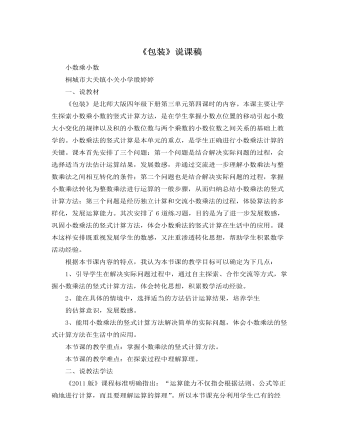
北师大版小学数学四年级下册《包装》说课稿
《包装》是北师大版四年级下册第三单元第四课时的内容。本课主要让学生探索小数乘小数的竖式计算方法,是在学生掌握小数点位置的移动引起小数大小变化的规律以及积的小数位数与两个乘数的小数位数之间关系的基础上教学的。小数乘法的竖式计算是本单元的重点,是学生正确进行小数乘法计算的关键。课本首先安排了三个问题:第一个问题是结合解决实际问题的过程,会选择适当方法估计运算结果,发展数感,并通过交流进一步理解小数乘法与整数乘法之间相互转化的条件;第二个问题也是结合解决实际问题的过程,掌握小数乘法转化为整数乘法进行运算的一般步骤,从而归纳总结小数乘法的竖式计算方法;第三个问题是经历独立计算和交流小数乘法的过程,体验算法的多样化,发展运算能力。其次安排了6道练习题,目的是为了进一步发展数感,巩固小数乘法的竖式计算方法,体会小数乘法的竖式计算在生活中的应用。
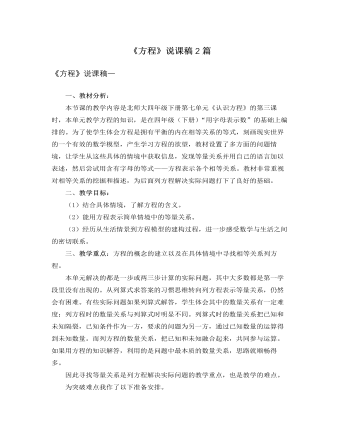
北师大版小学数学四年级下册《方程》说课稿2篇
3、变换角度,深入思考第三幅情境图隐含着多样的等量关系,也正是引发学生数学思考的最佳情境。根据学生认识的深入程度,可适当让学生体会到等式的“值等”和“意等”,并放手让学生探究,根据不同的认识找到不同的等量关系,列出等量关系不同的同解方程。在教学中,先引导孩子发现情境中的基本相等关系:2瓶水的水量+一杯水的水量=一壶水的水量,并且列出等式2z+200=2000,在此基础上,再引导孩子发现其他的等量关系。在这一过程中,充分激发孩子探求知识的欲望,调动孩子思考的主动性和灵活性,从而找到多样化的等量关系,并进一步提高孩子解决数学问题的能力。4、建立概念,判断巩固在前面教学的基础上总结、抽象出方程的含义。通过三道例题的简洁数学式子表达,让小组合作寻找他们的共同特点,从而建立方程的概念。“含有未知数”与“等式”是方程概念的两点最重要的内涵。并通过“练一练”让学生直接找出方程。
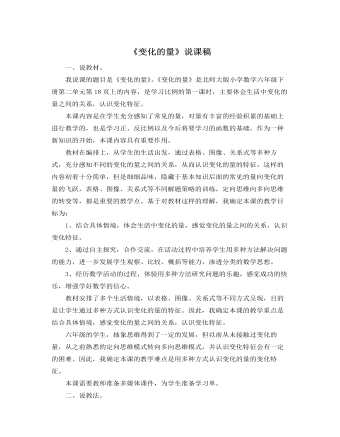
北师大版小学数学六年级下册《变化的量》说课稿
1、结合具体情境,体会生活中变化的量,感觉变化的量之间的关系,认识变化特征。2、通过自主探究,合作交流,在活动过程中培养学生用多种方法解决问题的能力,进一步发展学生观察、比较、概括等能力,渗透分类的数学思想。3、经历数学活动的过程,体验用多种方法研究问题的乐趣,感觉成功的快乐,增强学好数学的信心。教材安排了多个生活情境,以表格、图像、关系式等不同方式呈现,目的是让学生通过多种方式认识变化的量的特征。因此,我确定本课的教学重点是结合具体情境,感觉变化的量之间的关系,认识变化特征。六年级的学生,抽象思维得到了一定的发展,但以前从未接触过变化的量,从之前熟悉的定向思维模式转向多向思维模式,并认识变化特征会有一定的困难。因此,我确定本课的教学难点是用多种方式认识变化的量的变化特征。本课需要教师准备多媒体课件,为学生准备学习单。
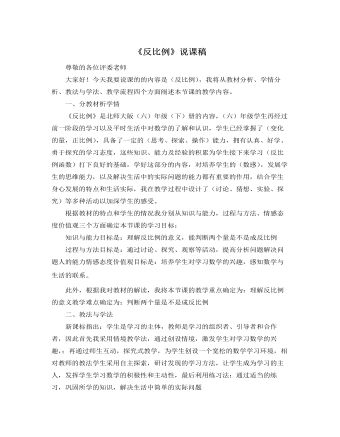
北师大版小学数学六年级下册《反比例》说课稿
知识与能力目标是:理解反比例的意义,能判断两个量是不是成反比例过程与方法目标是:通过讨论、探究、观察等活动,提高分析问题解决问题人的能力情感态度价值观目标是:培养学生对学习数学的兴趣,感知数学与生活的联系。此外,根据我对教材的解读,我将本节课的教学重点确定为:理解反比例的意义教学难点确定为:判断两个量是不是成反比例二、教法与学法新课标指出:学生是学习的主体,教师是学习的组织者、引导者和合作者,因此首先我采用情境教学法,通过创设情境,激发学生对学习数学的兴趣,;再通过师生互动,探究式教学,为学生创设一个宽松的数学学习环境,相对教师的教法学生采用自主探索,研讨发现的学习方法,让学生成为学习的主人,发挥学生学习数学的积极性和主动性,最后利用练习法:通过适当的练习,巩固所学的知识,解决生活中简单的实际问题
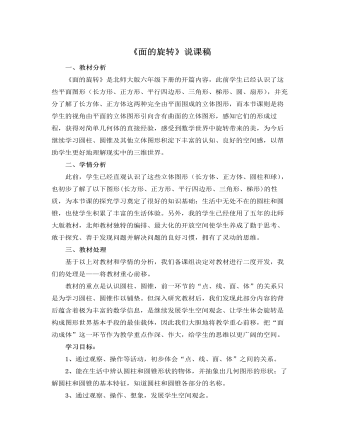
北师大版小学数学六年级下册《面的旋转》说课稿
2.放大空间,升华思考由于我对教材的二度开发留给了学生足够的探索空间,课上学生探索数学的热情被充分调动,我们欣喜地看到:有的学生尝试着不同平面图形的旋转;有的学生只用一种平面图形,却旋转出不同的立体图形;有的学生的思维并没有停留在表象上,而是在深入地思考产生这一现象的原因……交流时学生的发现远远超出了我们的想象,这份生成带给我们的是惊喜,是赞叹,更是“以操作促思考”的教学行为结出的硕果。3.巧用课件,形成表象本节课,我充分运用现代信息技术将平面图形经过旋转形成立体图形的过程生动、逼真地再现出来,帮助学生将抽象的空间想象化为直观,进而形成表象,深植于学生的脑海中,促进了学生空间观念的形成。总之,在这节课上,我坚持把“促进学生发展”作为第一要素贯穿于课堂教学的始终,让学生在充满着民主、探究、思考的氛围中,积极操作、主动思考,发展了学生的空间观念。

新人教版高中英语必修3Unit 5 The Value of Money- Discovering Useful Structure教学设计
Step 3 Meaning1. 过去将来时表示从过去某一时间来看将要发生的动作或存在的状态, 常用在宾语从句中。一般由“would/should +动词原形”构成。She hoped that they would meet again someday. 她希望将来有一天他们能再见面。2. was/were going to+动词原形: 表示过去将要发生或很有可能发生的动作, 常用于口语中, 表示预言、意图或者打算等。He was going to start work the following week. 他打算下星期开始工作。3. was/were about to do: 常用来表示即将发生的动作, “刚要/正要做……”。注意该结构不与任何时间状语连用。I felt that something terrible was about to happen. 我感到某种可怕的事情即将发生。4.was/were to do: 表示“曾计划做某事”, 如果表示“本来计划做某事, 动作没实现”, 则需用 “was/were to have done”。She said she was to have told me about the accident. 她说她本来想告诉我关于事故的事。5.Start, go, come, leave, see, meet等动词的过去进行时: 表示就过去某一时刻而言即将发生的动作。She was coming later. 她随后就来。I had just put on my overcoat and was leaving to visit a friend of mine. 我刚穿上外套要去看我的一个朋友。

新人教版高中英语必修3Unit 5 The Value of Money-Reading and Thinking教学设计一
Everybody wants to get wealth.In today’s material world,making money or becoming wealthy symbolizes a person’s success and capability. Many people just make every effort, pay any price to attain greater wealth. With money,they can buy nice, large apartments in nice neighborhood. With money they can own luxurious cars. Wealth seems to bring all happiness in life.But is wealth the only road to happiness? Not really. There are many things in the world, which are beyond the means of money, such as friendship, love, health and knowledge. People are so preoccupied with struggling for money that they have no time or would not take the time to form or maintain friendship. What happiness can they feel living as lonely miserable creatures without love or friends in the world even if they accumulate tremendous wealth?In my opinion, people can’t do anything without money, but money is not everything. What money will bring you depends on your personal belief and goal in life. If you are kind enough to help others, especially the poor, money is a good thing to you. With it, you can do much more for the benefit of people and your country, and it will add to your own happiness. If you want money just for your own needs, you’ll never be satisfied or happy. In a word,you should have money spent for more people. Only then can money be the source of your happiness.Step 8 Homework4 students in a group, one acts Roderick, one Oliver, one servant and the fourth one acts Henry Adams, then listen to the tape, pay more attention to the difference between American English and British English in pronunciation, stress, tone.

新人教版高中英语必修3Unit 5 The Value of Money-Listening &Speaking&Talking教学设计
4. A:We’d like to have someone to say a word at the beginning to welcome the group.B:↙Who?A:We thought that you or Dr.Johnson might do it.B用降调说Who,其意思是问,对方想让谁在开场时致欢迎词。Step 6 Pronunciation---Practice1. Listen to the short conversation and mark the intonation with ↗, ↙ or ↙, ↗. Then discuss with a partner what they intend to convey by using different intonation.Owner: You know what ?↗ It’s a million-pound bank note↙.Waiter 1: Really ?↗(question)Waiter 2: Really !↙(unbelievable and surprised)Waiter 3: Really ?!↙↗(first question then surprised)2. Listen to the conversations. Underline the parts that are stressed and mark the intonation. Then talk about the implied meanings of the responses with different intonations. Listen again and repeat.1) Henry: It’s a nice suit.Owner: Oh, it’s perfect!↙(The intonation means it is very suitable for Henry.)2) Henry: Well, that’s very kind of you.Owner: Kind, sir ?↗(what you said is not right) No, it’s kind of you. You must come whenever you want and have whatever you like. Just having you sit here is a great honour !!↙(welcome you to come again)3)Henry:Well, to be honest, I have none. Oliver:(happily) What luck!(excited) Brother↗, what luck!↙(It means “Didn’t you hear it?”)Henry: Well, it may seem lucky to you but not to me!↗(angry) If this is your idea of some kind of joke, I don’t think it’s very funny. Now if you’ll excuse me, I ought to be on my way.↙(If so, I would leave.)Roderick: Please don’t go↙...(hope Henry can wait for a moment)Part B Viewing and Talking---Describe people’s changing attitudes in a film clipStep 1 Before-listening---Tell the filmYou are going to watch part of the film The Million Pound Bank Note. Look at these photos and guess what happens in the film.

新人教版高中英语必修3Unit 5 The Value of Money-Listening &Speaking教学设计
Step 4: Listen again and decide if the following statements are true (T) or false (F).1 It was the first time Chen Liyan's story was reported. T口 F口2 Chen found 10,000 yuan in a small plastic bag in Taiyuan railway station口 F口3 Wang Zheng apologized to Chen because he couldn't offer her more money. T口 F口4 Chen took out a large loan to cure her daughter, T口 F口5 Wang set up a fundraising website for Chen's daughter after Chen told him about her situation. T口 F口Step 5:After listening, discuss the questions.1 What kind of person do you think Chen Liyan is?Chen Liyan is generous and honest because she returned a large sum of money to the owner.2 Did Chen return the money because she didn't need it?No. She returned the money because it was the right thing to do. Evidence for this is that she refused to accept the reward money because she felt that it had not been earned. 3 Is it common for people to do what Chen did?It depends on the culture. In some countries it is quite common to return money that has been found. In other countries, people believe "Finders are keepers!" 4 How did Wang Zheng feel about the return of his money?He must have been very happy and relieved to have gotten his money back. We know this because he thanked Chen repeatedly and even offered her a reward.5 Why did Ma Dongbao tell Wang about Chen's family?He must have had great sympathy for Chen and her daughter and wanted to help them.'We know this because he arranged help for them. 6 How did the news reporter feel about Chen's actions?The news reporter felt that it showed that money wasn't the most important thing in life. We know this because the reporter told us that this is what Chen believes. and then said, “that's a great attitude to take."

新人教版高中英语必修3Unit 5 The value of money-Reading and Thinking教学设计二
? Could you offer me some kind of work here?? I don’t want your charity, I just want an honest job.? Careless: I landed in Britain by accident.Step 7:Consolidation.? Find Henry? Roderick and Oliver were I .making a bet when they saw Henry, a poor young man. ? Know Henry? About a month ago, Henry was sailing and later he found himself carried out to sea by a strong wind. Fortunately, he 2.was spotted by a ship. And it was the ship that brought him to 3.England? Offer money to Henry ? Oliver and Roderick gave Henry a letter and told him that there was money in it. They 4.persuaded him to accept it, and made him 5.promise that it wouldn't be opened until 2 o'clock.Step 8:Language pointsa large amount of: a large quantity of; a great deal ofe.g. They bought a large amount of furniture before they moved their new house.make a bet: make an arrangement to risk money, etc. on an event of which the result is doubtful.e.g. We made a bet on the result of the match.permit sb to do something: allow somebody to do somethinge.g. My mother doesn’t permit me to ride in the street after it rained.by accident: as a result of chancee.g. I only found it by accident.stare at: look at somebody or something with the eyes wide open in a fixed gaze( in astonishment, wonder, fear, etc)to be honest: to tell you the truth; to be franke.g. To be honest, I don’t think we have a chance of winning.Step7 Homework:What do you think will happen to Henry? Will the bank-note help him or get him into trouble?

新人教版高中英语必修3Unit 5 The Value of Money-Reading for Writing教学设计二
2. 您能看到, 我头发太长了。You can see that my hair is much too long.3. 无论什么时候, 只要您想回来就回来。Please come back whenever you want.4. 您仅有很少的头发要理! You only have too little hair to cut !5. 为您服务是我的荣幸!It is my honour to serve you!Step 9 Writing(Henry is walking down the street when he sees a sign for a place that cuts hair. He decides to have it cut. )H=Henry B=BarberH: Good afternoon, I’d like to have my hair cut, if I may. (The barber looks at Henry’s hair and continues cutting another man’s hair. ) Er, I’d really like a haircut. As you can see it’s much too long. B: (in a rude manner) Yes, I can see that. Indeed, I can. H: Fine, well, I’ll have a seat then. (He sits in one of the barber’s chairs. The barber turns to look at Henry. )B: It’s quite expensive here, you know! Are you sure you can afford it?H: Yes. I think so. (After his hair is cut, the barber tells Henry how much he must pay. Henry shows the barber the bank note. )B: Why Mr. . . (looks shocked)H: Adams. Henry Adams. I’m sorry. I don’t have any change. B: Please don’t worry! (wearing a big smile) Nothing to worry about! Nothing at all! Please come back whenever you want, even if you only have too little hair to cut! It will be my honour to serve you!Step 10 Pair workExchange drafts with a partner. Use this checklist to help your partner revise his/her draft.1. Are all the elements of a play included and in good order ?2. Do the character use suitable language ?3. Are the stage directions clear and useful ?4. Is the plot clear and exciting enough ?

新人教版高中英语必修3Unit 5 the value of money-Reading For Writing教学设计一
【参考范文】Narrator:(Henry is smiling as he leaves the restaurant. As he is walking down the street, he sees a sign for a place that cuts hair. He decides to get it cut. )H=Henry;B=Barber;R=rude manH:Good afternoon, I'd like to get a cut, if I may. (The barber looks at Henry's hair and continues cutting another man's hair. )Er, I'd really like a haircut. As you can see it's much too long. B:(in a rude manner) Yes, I can see that. Indeed, I can. H:Fine, well I'll have a seat then. (He sits in one of the barber's chairs. The barber turns to look at Henry. )B:It's quite expensive here, you know!Are you sure you can afford it?H:Yes. I think so. (In comes the rude man. )R:Hey you there. I need a haircut quickly. Can you do me straightaway?B:All right, then, get in the chair and I'll see what I can do. R:Thank you. (sits down in one of the barber's chairs)H:Excuse me, but I was here first. Aren't you going to do my hair first?B:This man's in a hurry. H:Well so am I!I insist that you cut my hair first. B:OK, but I'll have to be quick. This gentleman is waiting. H:Thank you. (They both become quiet. After his hair is cut, the barber tells Henry how much he must pay. Henry shows the barber the bank note. )B:Why, Mr . . . (looks shocked)H:Adams. Henry Adams. I'm sorry, I don't have any change. R:You're that Mr Adams! Well,I'm glad I waited or I might never have known it was you. B:Why, Mr Adams, please don't worry!(wearing a big smile) Nothing to worry about!Nothing at all!Please come back any time, even if you only need too little hairs cut!It will be my honour to serve you!
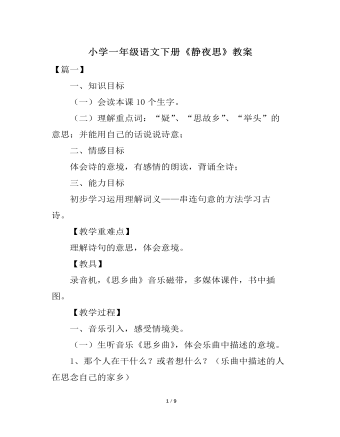
《静夜思》教案
(1)读整行诗。 (2)根据学生提出的问题理解“疑”的意思(怀疑、好像); “霜”(老师哈气在眼镜片上,并解释这是雾水,如果是冰粒,便是霜。霜在秋冬季节形成在地面附近:如房顶、草叶、地面等,堆起来是白色。) (3)说说这两行诗的意思。用上“什么好像是什么”的句式。(明亮的月光照在诗人的床前,好象是铺在地上的白白的霜) (4)朗读,引导。 诗人这样描写,给了你一种什么样的感觉?(冷清) 师描述:今晚,银白色的月光洒在地上,像铺了一层冰冷的霜一样。环境如此冷清,再加上诗人远离亲人的孤独,就更感到冷清了。
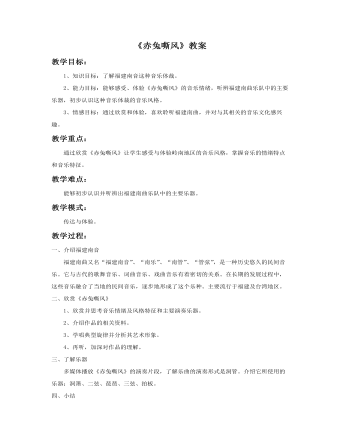
《赤兔嘶风》教案
一、介绍福建南音福建南曲又名“福建南音”、“南乐”、“南管”、“管弦”,是一种历史悠久的民间音乐。它与古代的歌舞音乐、词曲音乐、戏曲音乐有着密切的关系。在长期的发展过程中,这些音乐融合了当地的民间音乐,逐步地形成了这个乐种。主要流行于福建及台湾地区。二、欣赏《赤兔嘶风》1、欣赏并思考音乐情绪及风格特征和主要演奏乐器。2、介绍作品的相关资料。3、学唱典型旋律并分析其艺术形象。4、再听,加深对作品的理解。三、了解乐器多媒体播放《赤兔嘶风》的演奏片段,了解乐曲的演奏形式是洞管。介绍它所使用的乐器:洞箫、二弦、琵琶、三弦、拍板。
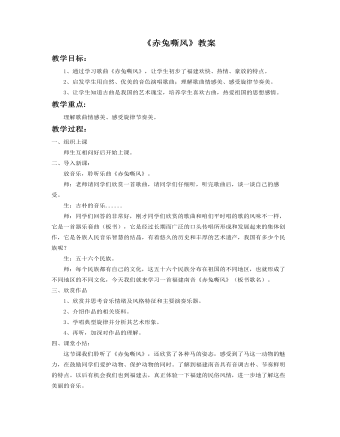
《赤兔嘶风》教案
教学目标:1、通过学习歌曲《赤兔嘶风》,让学生初步了福建欢快、热情、豪放的特点。2、启发学生用自然、优美的音色演唱歌曲;理解歌曲情感美、感受旋律节奏美。3、让学生知道古曲是我国的艺术瑰宝,培养学生喜欢古曲,热爱祖国的思想感情。这节课我们聆听了《赤兔嘶风》,还欣赏了各种马的姿态,感受到了马这一动物的魅力,在鼓励同学们爱护动物、保护动物的同时。了解到福建南音具有音调古朴、节奏鲜明的特点。以后有机会我们也到福建去,真正体验一下福建的民俗风情,进一步地了解这些美丽的音乐。
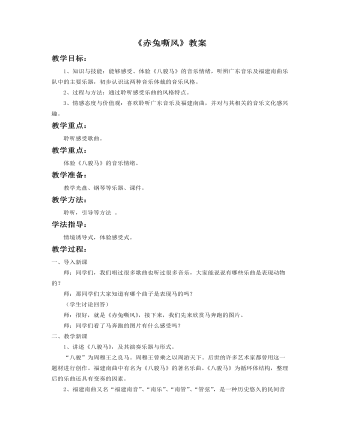
《赤兔嘶风》教案
一、导入新课师:同学们,我们唱过很多歌曲也听过很多音乐,大家能说说有哪些乐曲是表现动物的?师:那同学们大家知道有哪个曲子是表现马的吗?(学生讨论回答)师:很好,就是《赤兔嘶风》,接下来,我们先来欣赏马奔跑的图片。师:同学们看了马奔跑的图片有什么感受吗?二、教学新课1、讲述《八骏马》,及其演奏乐器与形式。 “八骏”为周穆王之良马。周穆王曾乘之以周游天下。后世的许多艺术家都曾用这一题材进行创作。福建南曲中有名为《八骏马》的著名乐曲。《八骏马》为循环体结构,整理后的乐曲还具有变奏的因素。2、福建南曲又名“福建南音”、“南乐”、“南管”、“管弦”,是一种历史悠久的民间音乐。它与古代的歌舞音乐、词曲音乐、戏曲音乐有着密切的关系。在长期的发展过程中,这些音乐融合了当地的民间音乐,逐步地形成了这个乐种。南曲包括了“指”、“谱”、“曲”三大部分。“指”是一种套曲;“谱”是有标题的器乐套曲;“曲”是有唱词的散曲,只唱不说。南曲的演奏形式有“上四管”、“下四管”之分。上四管以洞箫为主,叫做“洞管”;以笛子为主的叫做“品管”。
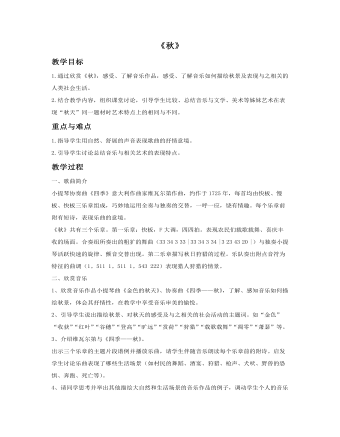
《秋》教案
欣赏音乐1、欣赏音乐作品小提琴曲《金色的秋天》、协奏曲《四季——秋》,了解、感知音乐如何描绘秋景,体会其抒情性,在教学中享受音乐审美的愉悦。2、引导学生说出描绘秋景、对秋天的感受及与之相关的社会活动的主题词。如“金色”“收获”“红叶”“谷穗”“登高”“旷远”“赏荷”“狩猎”“载歌载舞”“凋零”“萧瑟”等。3、介绍维瓦尔第与《四季——秋》。出示三个乐章的主题片段谱例并播放乐曲,请学生伴随音乐朗读每个乐章前的附诗。启发学生讨论乐曲表现了哪些生活场景(如村民的舞蹈、酒宴、狩猎、枪声、犬吠、野兽的恐惧、奔跑、死亡等)。4、请同学思考并举出其他描绘大自然和生活场景的音乐作品的例子,调动学生个人的音乐经验,引发其对于音乐具有描绘性功能的认识和兴趣。
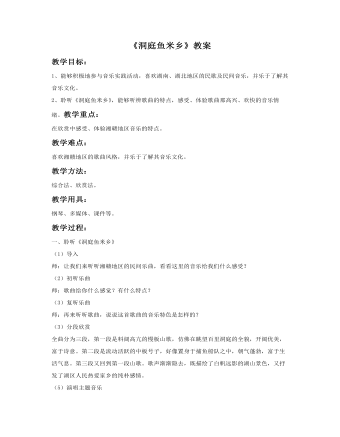
《洞庭鱼米乡》教案
一、聆听《洞庭鱼米乡》 (1)导入 师:让我们来听听湘赣地区的民间乐曲,看看这里的音乐给我们什么感受? (2)初听乐曲 师:歌曲给你什么感觉?有什么特点? (3)复听乐曲 师:再来听听歌曲,说说这首歌曲的音乐特色是怎样的?(3)分段欣赏全曲分为三段,第一段是料阔高亢的慢板山歌,仿佛在眺望百里洞庭的全貌,开阔优美,富于诗意。第二段是流动活跃的中板号子,好像置身于捕鱼船队之中,朝气蓬勃,富于生活气息。第三段又回到第一段山歌。歌声渐渐隐去,既描绘了白帆远影的湖山景色,又抒发了湖区人民热爱家乡的纯朴感情。(5)演唱主题音乐
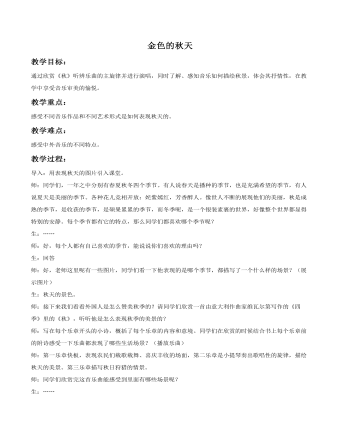
《秋》教案
导入:用表现秋天的图片引入课堂。师:同学们,一年之中分别有春夏秋冬四个季节。有人说春天是播种的季节,也是充满希望的季节,有人说夏天是美丽的季节。各种花儿竞相开放:姹紫嫣红,芳香醉人。像世人不断的展现他们的美丽,秋是成熟的季节,是收获的季节,是硕果累累的季节,而冬季呢,是一个银装素裹的世界,好像整个世界都显得特别的安静。每个季节都有它的特点,那么同学们都喜欢哪个季节呢?生:……师:好,每个人都有自己喜欢的季节,能说说你们喜欢的理由吗?生:回答师:好,老师这里呢有一些图片,同学们看一下他表现的是哪个季节,都描写了一个什么样的场景?(展示图片)生:秋天的景色。师:接下来我们看看外国人是怎么赞美秋季的?请同学们欣赏一首由意大利作曲家维瓦尔第写作的《四季》里的《秋》,听听他是怎么表现秋季的美景的?师:写在每个乐章开头的小诗,概括了每个乐章的内容和意境。同学们在欣赏的时候结合书上每个乐章前的附诗感受一下乐曲都表现了哪些生活场景?(播放乐曲)师:第一乐章快板,表现农民们载歌载舞、喜庆丰收的场面,第二乐章是小提琴奏出歌唱性的旋律,描绘秋天的美景。第三乐章描写秋日狩猎的情景。
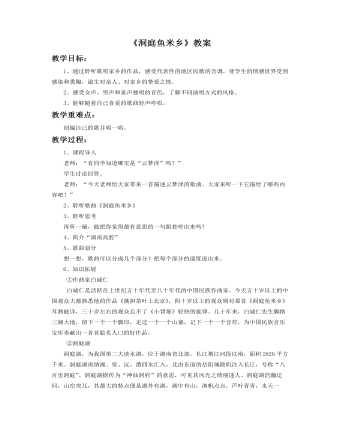
《洞庭鱼米乡》教案
知识拓展①作曲家白诚仁白诚仁是活跃在上世纪五十年代至八十年代的中国民族作曲家。今天五十岁以上的中国观众大都熟悉他的作品《挑担茶叶上北京》,四十岁以上的观众则对那首《洞庭鱼米乡》耳熟能详,三十岁左右的观众忘不了《小背篓》轻快的旋律。几十年来,白诚仁先生脚踏三湘大地,留下一个一个脚印,走过一个一个山寨,记下一个一个音符,为中国民族音乐宝库奉献出一首首脍炙人口的好作品。 ②洞庭湖洞庭湖,为我国第二大淡水湖,位于湖南省北部,长江荆江河段以南,面积2820平方千米。洞庭湖南纳湘、资、沅、澧四水汇入,北由东面的岳阳城陵矶注入长江,号称“八百里洞庭”。洞庭湖据传为“神仙洞府”的意思,可见其风光之绮丽迷人。洞庭湖浩瀚迂回,山峦突兀,其最大的特点便是湖外有湖,湖中有山,渔帆点点,芦叶青青,水天一色。

